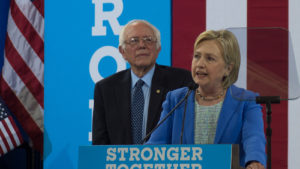Why Won’t the Mainstream Media Tell the Truth About ‘Medicare for All’? (Updates)
A "fact-check" challenging Bernie Sanders and Alexandria Ocasio-Cortez’s claims about the legislation's cost efficiency is misleading at best and willfully dishonest at worst. CNN correspondent Jake Tapper (Twitter screen grab)
CNN correspondent Jake Tapper (Twitter screen grab)
Update #2: Bernie Sanders has weighed in on the controversy himself, correcting the mainstream media’s most common mistakes about “Medicare for all” and the Mercatus study in a lengthy Twitter thread. In his concluding tweet, he writes: “The question that must be asked is why would the corporate media would put their blind faith in a far right-wing economist whose past reports have been so thoroughly discredited by mainstream economists and experts?”
Update: Amid a rash of criticism from journalists and policy analysts alike, Jake Tapper has vowed to issue a correction, acknowledging that Sanders never argued “Medicare for all” would save the U.S. government $2 trillion. But Bruenig maintains that there are “deeper problems with his fact check that also reflect the deeper problems in just about every other fact check.” In a blog post for the People’s Policy Project published Monday, he wonders why Tapper only consulted with the Mercatus Center’s Charles Blahous, or if he’s read the Sanders legislation at all.
“This is the kind of nonsense we are dealing with here,” he writes. “Tribal affiliations are getting in the way of basic presentations of facts and figures. The centrist and liberal media brand themselves as truth-tellers, but that’s all it is: a brand. When the truth goes agains their tribe or ideological priors, they become just as bad as Fox News.”
The original story can be found below:
At the end of a segment posted Friday in conjunction with factcheck.org, CNN’s Jake Tapper issues a playful warning to the country’s politicians: “You’re perfectly entitled to your own opinions,” he quips, “not to your own facts.”
It’s a piece of advice the correspondent would be wise to heed himself. As a pair of essays published in Jacobin this week demonstrate, his comprehensive fact-check of Sen. Bernie Sanders, I-Vt., and Alexandria Ocasio-Cortez’s claims about the cost-efficiency of “Medicare for all” is misleading at best and willfully dishonest at worst.
The subject of Tapper’s report is a study from the Mercatus Center at George Mason University, a libertarian think tank underwritten by the Koch brothers. More specifically, he focuses on Sanders and Ocasio-Cortez’s contention that the study’s findings indicate universal health care would save money over a 10-year period.
“Is that true?” Tapper asks incredulously. “Did a study funded by the Koch brothers indicate that Medicare for All would actually save the U.S. government trillions of dollars? No, it’s not true, at least not according to the author of the study.”
After carefully noting an Associated Press investigation that exposed the Koch brothers’ control over the hiring and firing of educators at George Mason University, Tapper then proceeds to quote at length from the Mercatus Center’s Charles Blahous, who refutes Sanders’ assertion that the proposed legislation would lower the projected cost of all health care expenditures by $2 trillion. From the segment:
It is likely that the actual cost of [Medicare for all] would be substantially greater than these estimates, which assume significant administrative and drug cost savings under the plan, and also assume that health care providers operating under [Medicare for all] will be reimbursed at rates more than 40 percent lower than those currently paid by private health insurance.
Put simply, this is false. What the Mercatus study actually indicates is that Medicare provider rates would come in 40 percent below private insurance rates, but the cuts in reimbursement would be considerably lower than the number provided by Blahous.
“This is because only 56 percent of Americans have private insurance,” writes Matt Bruenig in Jacobin. “So, while private insurance patients would see their payments reduced by 40 percent, Medicare patients would not see their payments reduced at all, and Medicaid and uninsured patients would actually see their payments increase.”
The $2 trillion in savings are not for the U.S. government, as Tapper erroneously suggests Sanders is arguing, but the American people overall. And it’s no surprise that Blahous might try to distance himself from such a conclusion. (In fact, that detail is entirely omitted from the abstract of the study.)
Tapper’s segment appears to echo The Washington Post, which Bruenig notes has repeated such untruths in a separate fact-check of Ocasio-Cortez and a video segment accompanying an editorial titled “The cosmically huge ‘if’ of Medicare for all.” (Editor’s note: This video appears to have been removed subsequent to the publication of the Jacobin piece.) Incredibly, The Washington Post’s own Glen Kessler has acknowledged the 40 percent claim as false, yet both articles have gone uncorrected.
“In some ways, the undead nature of this falsehood is a perfect microcosm of the problems our society faces in dealing with fake news,” continues Bruenig. “Once a false report is out there, it is devilishly difficult to undo the damage it has caused because, even if it is corrected, few people ever recognize the correction and so many people wind up repeating the false report.”
Watch Jake Tapper’s segment here.
Read Matt Bruenig’s articles here and here.
Your support matters…
Independent journalism is under threat and overshadowed by heavily funded mainstream media.
You can help level the playing field. Become a member.
Your tax-deductible contribution keeps us digging beneath the headlines to give you thought-provoking, investigative reporting and analysis that unearths what's really happening- without compromise.
Give today to support our courageous, independent journalists.






You need to be a supporter to comment.
There are currently no responses to this article.
Be the first to respond.